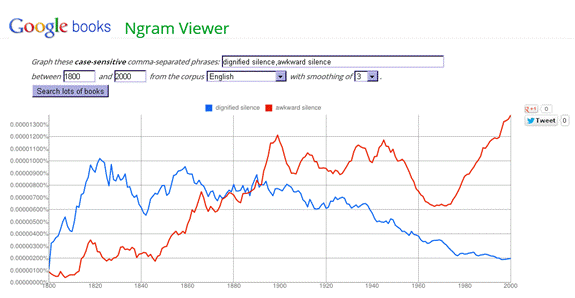Language Lounge
A Monthly Column for Word Lovers
Talk About Silence
Most of life is so dull that there is nothing to be said about it, and the books and talk that would describe it as interesting are obliged to exaggerate, in the hope of justifying their own existence. Inside its cocoon of work or social obligation, the human spirit slumbers for the most part, registering the distinction between pleasure and pain, but not nearly as alert as we pretend. There are periods in the most thrilling day during which nothing happens, and though we continue to exclaim, "I do enjoy myself," or, "I am horrified," we are insincere. "As far as I feel anything, it is enjoyment, horror" — it's no more than that really, and a perfectly adjusted organism would be silent.
— E. M. Forster
The passage above, from Forster’s novel A Passage to India, is interestingly placed at the beginning of a chapter (XIV) in which silence does not prevail and talk, some of it hysterical, snowballs into an unfounded character assassination of one of the book’s fictional inhabitants. It sums up nicely one of the overlooked virtues of silence: its role as the desirable condition of creatures when there is not anything in particular that they need to say or do, and its great merit in being a state less likely to lead to trouble than its opposite: talk.
Forster was not the first or the last to praise silence; people do it all the time and it’s unfortunate that the praise of silence always takes the form of words, which have the function of usurping silence from the get-go. But how else are you going to call attention to the benefits of silence? If you do so by exemplifying it, chances are that no one will notice, because praiseworthy silences are always context-driven. You wouldn’t know that from the worthies whose words have come down to us in praise of silence; they give the impression the silence generally is a marvelous thing, like Shakespeare in Much Ado About Nothing:
Silence is the perfectest herald of joy: I were but little happy, if I could say how much.
or the Scottish writer Thomas Carlyle:
Silence is deep as Eternity, speech is shallow as Time.
The great thing about Forster’s quote is that he sets his readers up for the expectation that opportunities for silence will be wasted and then he shows us the consequences of talk. Like other great novels, A Passage to India repays the investigation of themes that you may wish to explore in it. It’s instructive to skim through the occurrences of silence in the text of the book (which you can do here) to see how different characters use it or respond to it.
Is the modern hooked-up and linked-in world losing an appreciation for silence? You would have to be living under a rock not to think so. Here’s Aldous Huxley in a good old-fashioned, silence-defying rant, written in 1946: before the advent of television, the Internet, mobile telephony, social networking, and Twitter:
The twentieth century is, among other things, the Age of Noise. Physical noise, mental noise and noise of desire — we hold history's record for all of them. And no wonder; for all the resources of our almost miraculous technology have been thrown into the current assault against silence. That most popular and influential of all recent inventions, the radio is nothing but a conduit through which pre-fabricated din can flow into our homes. And this din goes far deeper, of course, than the eardrums. It penetrates the mind, filling it with a Babel of distractions, blasts of corybantic or sentimental music, continually repeated doses of drama that bring no catharsis, but usually create a craving for daily or even hourly emotional enemas. And where, as in most countries, the broadcasting stations support themselves by selling time to advertisers, the noise is carried from the ear, through the realms of phantasy, knowledge and feeling to the ego's core of wish and desire. Spoken or printed, broadcast over the ether or on wood-pulp, all advertising copy has but one purpose — to prevent the will from ever achieving silence. Desirelessness is the condition of deliverance and illumination. The condition of an expanding and technologically progressive system of mass production is universal craving. Advertising is the organized effort to extend and intensify the workings of that force, which (as all the saints and teachers of all the higher religions have always taught) is the principal cause of suffering and wrong-doing and the greatest obstacle between the human soul and its Divine Ground.
You wonder how Huxley would cope with life today, when our world is even more glutted with words that regularly escape their writers and speakers and are instantly broadcast globally, long before anything like reflection might take place. Would Mr. Huxley have a Twitter account? Would he post status updates on Facebook? You would hope not, but we are all creatures of our times to some degree.
We looked at silence in a historical context to see how it might be faring with the public, and the results suggest that the masses are indeed losing a taste for it. Here’s a telling graph from Google Ngrams, showing the trajectories of dignified silence and awkward silence over the last couple of centuries:

Dignified silence seems to have reached a peak of sorts around 1820 and it has been on a mainly downhill course since then. Awkward silence, on the other hand, seems set on an unstoppable career path. If you fear awkward silence yourself, you can generate this Ngram graph on your own internet-connected device and then click on Tweet, further contributing to the demise of dignified silence — for Twitter surely is the greatest threat to dignified silence that the modern world has yet developed. Other salient collocations of adjective + silence show similar patterns when viewed historically: embarrassed silence overtook respectful silence in about 1940; Eerie silence skyrocketed past discreet silence in the 1980s.
Today’s world does indeed seem to be much more friendly and welcoming to the silence-avoider than the silence-seeker. There is, for example, TweetSpeaker, an iPhone app that that reads Tweets out loud. TweetSpeaker gets gushing reviews from its users — one blogger describes it as “crazy beautiful.” But surely, if you wished to design a perfect hell, you would ensure that its inhabitants all had TweetSpeaker on their iPhones, tuned to break up silence with the Twitter feeds of the Kardashians, perhaps, with no possibility of turning them off for eternity.
Will today’s younger generations miss the opportunity to experience, exploit, and learn the virtues of silence? We ponder this when we see reps of these generations in situations in which the enjoyment of silence is a possibility. They are never actually enjoying the silence; they are completely engrossed in the diversions available to them through their electronic devices. Though it requires words to do it, it seems worthwhile to point out that there are still — and always will be — times when nothing need be said, events and utterances that do not require us to give a response, and many situations when there is much is to be gained by attending to the dwindling supply of silence available to us.


